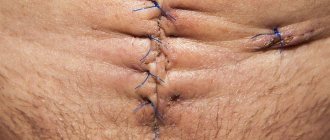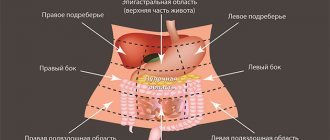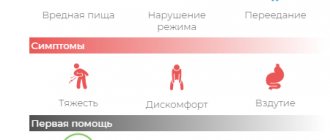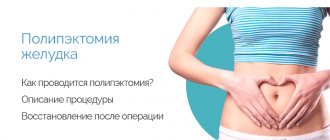Removal of the stomach or gastrectomy is a traumatic procedure that is difficult for the patient and leaves lifelong complications, but stomach cancer has no chance of cure if surgery is not performed.
- Indications for gastric removal surgery for cancer
- How is the stomach removed for cancer?
- What is the best operational access when deleting?
- Stages of stomach removal
- Recovery after surgery
- Complications after cancer surgery
- Rehabilitation after stomach removal for cancer
- Prognosis after gastric removal
Before surgery, a cancer patient rarely thinks about how to live after removal of the stomach; it is important for him to quickly get rid of the tumor in order to survive. After surgical treatment, the understanding comes that the missing organ cannot be replaced with an artificial one, and health problems can no longer be avoided.
Indications for gastric removal surgery for cancer
Modern oncology strives to minimize the volume of tissue removed in order to minimize complications after surgery and subsequent suffering of the patient, however, complete removal of the stomach is one of the most common operations for cancer.
Gastrectomy is performed for tumors of both stages 1 and 3; an absolute contraindication for surgical intervention is the presence of distant cancer metastases.
Gastrectomy is performed when a smaller operation is not feasible or does not guarantee the absence of relapse. Gastrectomy is the last option for salvation; carcinoma cannot be cured in any other way.
Only in one case, with stage 4 gastric carcinoma, there is a relative contraindication to surgery - metastasis to the ovary. Relative because, if it is possible to remove the primary tumor and the ovary affected by metastases, two operations are performed simultaneously: gastrectomy and oophorectomy, sometimes together with the uterus. But if something cannot be removed, the surgical stage of treatment is replaced with chemotherapy.
Dream
Sleep is not directly related to the operation, but it does influence its outcome. Good rest helps normalize metabolic processes. People who sleep well have an easier time controlling their appetite. They are less likely to encounter that false feeling of hunger, which often occurs against the background of overwork and fatigue.
To get enough sleep, try to turn off all sources of information (TV, laptop, mobile phone) at least an hour before going to bed. Take a walk in the fresh air in the evening. Do not exercise less than 2 hours before bed, especially in a stuffy gym. Warm baths, meditation practices, auto-training, and relaxing massage help normalize sleep.
How is the stomach removed for cancer?
The approach to the stomach through the abdominal wall - surgical access - depends on the patient’s condition and the extent of the tumor process in the esophagus. During the operation, the esophagus is crossed 5–7 centimeters above the tumor, the stomach and omental bursae with lymph nodes are completely removed. There should not be a single tumor focus left in the abdominal cavity.
Typical incisions of the skin and soft tissues of the abdomen:
- The classic incision is along the midline of the abdomen - this is a midline laparotomy.
- In some cases, they resort to extending the incision from the abdomen to the chest wall - this is a thoracolaporotomy.
- If it is necessary to remove a significant portion of the affected esophagus, in addition to the median laparotomy, an incision is made between the ribs.
- The esophagus affected by cancer can also be approached from the inside - through the diaphragm, which is also possible with classical access.
Postoperative period
In the postoperative period, the patient begins to understand how difficult it is to live after gastric resection. The wound on the abdominal wall is a burden, but every day it becomes less and more worrying because of the drainage left in the wound and the intestinal tube installed through the patient’s nose.
Drainage in the wound is required to control the condition of the abdominal cavity, where fluid can accumulate and blood will appear if bleeding occurs. Through drainage, the consistency of the gastrointestinal connection - anastomosis - is determined. The drainage is removed when the damaged tissue inside the abdominal cavity has healed safely.
With a significant decrease in the contractile activity of the intestine, intubation helps to free the intestinal tube from gases and, if necessary, from the resulting liquid; the probe is removed by the end of the week, when the function of the gastrointestinal anastomosis is improved and intestinal motility is restored.
What is the best operational access when deleting?
There are no standards defining where and how much to cut the abdominal wall and how far to advance in the chest cavity; everything is based on the individual characteristics of the particular patient and the tumor lesion.
The oncologist surgeon independently chooses a surgical approach that, with maximum visibility of the field of activity, allows minimal damage to healthy tissue and the optimal surgical technique, which reduces the possibility of complications after removal of the stomach.
Today, in case of early cancer, open operations are successfully replaced by endoscopic technologies; laparoscopic gastrectomy is undoubtedly technically more difficult, but it is more beneficial for the patient, since it does not increase complications after the operation, and the patient’s recovery is faster.
The method of access to the diseased organ and the surgical technique are determined by the oncologist surgeon; his choice reflects practical surgical experience and personal skills; rest assured, the professional qualifications of our clinic’s specialists are always at the “top class” level.
Price
240 000 ₽
Surgery: longitudinal resection (sleeve resection/drain)
What is included in this price:
All necessary tests
Preoperative preparation
Stay in a 3-bed room in a hospital (TV, shower, toilet, air conditioning). It is also possible to stay in single and double rooms for an additional fee.
Three meals a day
Operating team consisting of: Boris Yuryevich Tsvetkov, two assisting surgeons, operating nurse, anesthesiologist
The operation is performed laparoscopically. German expert-class equipment KARL STORZ is used
American-made staplers Johnson & Johnson
Inhalation anesthesia is non-toxic and safe. Imported drugs are used for anesthesia. The active effect of anesthesia stops 30 minutes after surgery. The patient comes to his senses. Residual effects are mild drowsiness. Can last up to 2 hours
Postoperative period: dressings, systems, consultations
Extract with written recommendations from the doctor
Consultation with a doctor within one year after surgery
Stages of stomach removal
The course of the operation to remove all or only part of an organ (resection) proceeds according to the same plan, but with a different volume of tissue removed.
- First, mobilization is carried out - cutting off the organ from the internal ligaments that fix it, ligating the supplying arteries and veins. At the same time, a thorough examination of the abdominal organs is carried out and, based on what is seen, adjustments are made to the operation plan.
- The second stage is the actual removal, with cutting off the stomach from the esophagus and duodenum. When nearby organs of the abdominal cavity are involved in the tumor conglomerate, including the diaphragm or liver, pancreas or large intestine, if technically possible, complex and extensive combined operations are performed, that is, gastrectomy and, for example, resection of the pancreas or liver.
- The third stage is the restoration of the digestive tract, that is, the connection of the esophagus with the intestines, which will ensure the further movement of food.
Recovery after surgery
Stomach cancer leads to serious intracellular changes; all biochemical processes are disrupted, since the body does not receive the substances it needs due to impaired absorption in the gastrointestinal tract. A few decades ago, every fourth patient died after gastrectomy; today complications and mortality are reduced to minimal levels.
Postoperative recovery is very individual; it is affected by the age and gender of the patient, his existing chronic diseases and the degree of impairment caused by carcinoma, the involvement of other abdominal organs and the “live” weight of the patient. Even the time of year affects the duration of recovery; summer is not the most favorable time for surgical procedures.
The main thing for the patient is not to rush to leave the clinic after removal of the stomach, since incomplete treatment measures will subsequently result in health problems that can completely ruin life.
Many patients are frightened by the phrase “gastric resection”. How justified are these fears?
Longitudinal gastrectomy is not at all the same resection that is performed for cancer or peptic ulcer disease. With PRG, the lateral part of the stomach is removed, while the important physiological valves of the stomach (cardiac sphincter and pylorus) are preserved, and thus the stomach after PRG remains physiologically quite functional. From a voluminous sac, the stomach turns into a narrow tube, where food does not stay long and quickly passes into the intestinal tract. The secretory activity of the stomach, of course, decreases, but this also plays into the hands of the goal of weight loss.
Complications after cancer surgery
Early complications are few, but if not detected in time, they can be fatal for the patient.
The failure of the sutures at the junction of the esophagus with the intestine - at the anastomosis - does not arise because the surgeon “did something wrong”, but is due to the insufficiency of the body’s internal reserves, homeostasis disorders, weakness of the immune defense and inadequate nutrition - nutritional status before treatment. The incidence of this complication ranges from 2% to 10%.
Impaired outflow of pancreatic secretions due to swelling of the pancreas can lead to the development of acute pancreatitis. The incidence of pancreatitis is affected by surgical technique, but the determining role is played by the volume of tissue removed and the initial condition of the gastrointestinal tract. The main thing is to diagnose the complication in time and carry out adequate drug prevention.
Failure of sutures and pancreatitis can initiate inflammatory processes inside the abdominal cavity, in particular, an abscess or peritonitis, intestinal obstruction or local accumulation of fluid.
The percentage of the listed pathological postoperative conditions is small, and in our clinic it is significantly lower than the average statistical values, because the result reflects the talent and experience of the oncologist surgeon in combination with excellent diagnostic capabilities.
Treatment of dumping syndrome
Conservative treatment of dumping syndrome is aimed at eliminating factors that provoke attacks, creating optimal conditions for digesting food in the stomach, and slowing down the evacuation of the food bolus from the stomach into the intestines.
Diet plays a key role in the treatment of dumping syndrome. Patients should eat frequently, at least six times a day. Serving volume - up to 150-200 ml. Separate meals are practiced: first the patient eats a solid dish, which lingers in the stomach for a long time, and half an hour later - a liquid dish. Simple carbohydrates, milk and other dairy products that provoke attacks are completely excluded from the diet. It is recommended to limit the consumption of fatty foods.
When treating illness of the operated stomach, the temperature of the food is of great importance. The hotter the food, the faster it is evacuated into the intestines. With dumping syndrome, patients should eat food that is no higher than body temperature. After eating, it is recommended to lie down for 20-30 minutes; in a horizontal position, the movement of the food bolus through the gastrointestinal tract slows down.
Patients with moderate dumping syndrome are prescribed general restorative drug therapy: B vitamins in injection form, droppers with glucose and insulin. With significant weight loss, droppers with albumin and anabolic steroids are prescribed. Vitamin D3 and calcitonin are used to strengthen bone tissue and prevent osteoporosis.
In order to speed up the digestion of food, the patient takes digestive enzymes before meals. To slow down peristalsis, subcutaneous injections of atropine are used. Sedatives are prescribed according to indications.
Surgical treatment is indicated for patients with a severe form of dumping syndrome, when attacks occur daily and are provoked by almost any food. During the operation, the anastomosis is reconstructed with the restoration of the passage of food through the duodenum.
Rehabilitation after stomach removal for cancer
It is impossible to overestimate the importance of restorative measures after gastrectomy; by and large, good health “comes” to the patient a month after discharge from the hospital. If we try to briefly answer the question “how do they live after removal of the stomach,” then it definitely doesn’t matter when they live without the help of specialists.
The wound will heal, but restoration of normal nutritional status in the altered digestive tract is difficult - simply pureed and steamed food does not solve the problem. And the problem is associated with a lack of immunity and the lack of complete absorption of nutrients necessary for the body.
For a speedy recovery and continuation of antitumor treatment, an individual rehabilitation program is required.
Reviews
- Review by Anton Nikolaevich Logvin
The operation was performed 6 years ago. Weight was 175. My knees started to hurt. It was impossible to find clothes. Constant feeling of hunger. Now I weigh 110. The weight suits me. I don't want to lose weight anymore. Boris Yurievich Tsvetkov is a surgeon from God, a very decent person and a wizard, an architect of human bodies. I'll say this.
Photos and interviews
- Review by Olga Vladimirovna Ryabokon
Before the operation, the weight was 154 kg and there were a million concomitant diseases. Now 87-88. I’m no longer treating diabetes, it doesn’t bother me, my blood pressure is very rare. At 64 years old, I don’t walk, I run. Before, I couldn’t walk through the kitchen; I was out of breath.
And after me, my daughter also had the same operation. All the best that I can, I know, all the good words, I dedicate everything...
Photos and interviews
- Review by Irina Sergeevna
Thank you very much to Boris Yuryevich for the gift of a new happy life, with all my heart. I say that I celebrate the day of the operation as my second birthday. My life has changed, my mind has brightened, my soul has brightened, I don’t know, it’s as if I’ve actually become younger. I was 44, now I’m 45, a new life has begun. Thanks to him for his golden hands, thanks to the whole team...
Photos and interviews
- Review by Marina Konstantinovna and Nate Donelson
I would like to express my deep gratitude to Boris Yuryevich and his entire team. The man who changed my life, who changed my husband's life, who saved my husband's life. I am very grateful to him. We are now planning a second child. He may have saved another life. We will have a second child, and at my former weight I could not give birth.
This is a surgeon...
Photos and interviews
- Review by Alexander Semchev
Friends! Previously, some time ago, it was difficult for me to live because the moment of my “promiscuity” played a bad joke on me. But, thank God, Dr. Tsvetkov and his clinic appeared in my life. Thanks to his efforts, his attention, I began to live differently. Of course, with a plus sign.
Photos and interviews
- Anna's review
I would like to say a huge thank you to Boris Yuryevich. He told me everything about the operations competently and in a language that I could understand, where there were any pros and cons. He gave me comprehensive answers to all my questions. He is a professional with extensive experience whom I trusted. I can say one thing. That this is a person who tells patients it like it is, in simple language accessible to...
Photos and interviews
- Review by Tatiana
Boris Yuryevich is a great guy, of course. Attentive, he told me everything that interested me. I walked differently from Marina, for example. Marina probably teased him for a very long time; he probably told a lot of things for a long time. I flew on wings. Everything would have been done faster for me. But what interested me, for example, the same operation, what to do...
Photos and interviews
- Alina's review
Boris Yurievich Tsvetkov is truly a doctor of the highest category, who is adapted for people. All people are different. Some work for their own personal gain. And Boris Yuryevich works for the people. It is available 24/7, which was very important to me. That I could call him at night and say: “Boris Yuryevich, I’m not feeling very well.” He always…
Photos and interviews
- Olga's review
Thanks to Boris Yuryevich for making people beautiful and happy. I already told him that I really have become more beautiful, younger, and much happier. I would like to wish him long life, even more career growth, newer modern technologies.
It's too bad he doesn't do breasts. It does the stomach, but he says I don’t do the chest now. And that’s what I would do...
Photos and interviews
- Valeria's review
I had gastric resection surgery and I am very pleased. What happened before and what happened after is noticeable in life, in health, in everything. A person changes - this is a new life. There is no need to be afraid of this operation, you need to go and do it. Boris Tsvetkov is a worthy, high-quality surgeon who will care for and guide his patient from beginning to end. In the hospital…
Photos and interviews
- Feedback from Natalya Anatolyevna Kukshina
I am a person who, at the age of 26 (at the time of the operation), has experienced a lot - various cleansing programs, nutritionists, fitness programs for losing weight, buying and consuming tons of products, as advertising aimed at weight loss instills in us, I can only say one thing. If you have problems with excess weight, diseases caused by excess...
Photos and interviews
- Alexey's review
What Boris Yuryevich Tsvetkov did... I want to say frankly. Without praising him, nothing, simply, what Tsvetkov did - he simply did what is impossible to do, you know? Tell someone else. I talked with other doctors, with endocrinologists, with therapists, there are a lot of people we know in medicine. Even people who are in this profession…
Photos and interviews
Prognosis after gastric removal
Oncological statistics know how long patients with gastric carcinoma live, depending on the stage. There is no literature data on whether removal of the most important part of the digestive tract shortens life, but it is known for sure that the patient’s life expectancy depends on the prevalence of primary carcinoma and the biological characteristics of cancer cells - differentiation, their sensitivity to chemotherapy and concomitant diseases.
Oncological science is very precise, it knows what diagnostic algorithm is needed for the disease, what percentage of patients at different stages and how many years they live on average, and can offer a whole range of therapeutic measures for certain morphological characteristics of carcinoma.
There is one thing that oncology cannot do - give a specific patient a prescription for optimal treatment with an exact schedule of the manipulations and procedures he needs. But experienced oncologists at Euroonco can and do do this.
| More information about the treatment of stomach cancer at Euroonco: | |
| Treatment of stomach cancer | |
| Oncologist-gastroenterologist | RUB 5,100 |
| Chemotherapy appointment | RUB 6,900 |
| Emergency oncology care | from 12,100 rub. |
Book a consultation 24 hours a day
+7+7+78
Bibliography
- Davydov M.I., Turkin I.N., Polotsky B.E./Modern surgery of gastric cancer: from D2 to D3//Proceedings of the IX Russian Oncological Congress; Moscow 2005.
- Stilidi I.S., Nered S.N./Modern ideas about the basic principles of surgical treatment of locally advanced gastric cancer // Practical Oncology; 2009; T.10, No. 1.
- Yankin AB/Modern surgery of gastric cancer //Practical Oncology; 2009; T. 10, No. 1.
- Curcio G., Mocciaro F., Tarantino I. et al./Self-Expandable Metal Stent for Closure of a Large Leak after Total Gastrectomy //Case Rep. Gastroenterol.;2010; No. 4.
- Etoh T., Inomata M., Shiraishi N., Kitano S./Revisional Surgery After Gastrectomy for Gastric Cancer //Surg. Laparosc. Endose. Percutan. Tech.;2010.;v. 20, no. 5.
- Isgiider AS, Nazli O., Tansug T., et al/ Total gastrectomy for gastric carcinoma// Hepatogastroenter.; 2005; v. 52.
- Zhang CH, Zhan WH, He YL et al. /Spleen preservation in radical surgery for gastric cardia cancer //Ann. Surg. Oncol.; 2007; v. 14.








